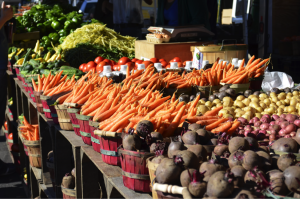By Kaitlin Krull, Contributor for Modernize.com
For many families, grocery shopping is seen as a chore rather than a positive experience. Just getting through the aisles can feel like an impossible task, with screaming kids, grumpy parents, and hordes of other shoppers obstructing any hope of a quick exit. Fortunately, shopping at local farmers’ markets is an entirely different experience. Shopping locally for your produce offers benefits for you, the local community and, believe it or not, your children. Here are just a few of the amazing things your kids can learn on a trip to the farmers’ market.
Where their local produce comes from
One of the first things your children will be able to do at the farmers’ market is develop a relationship with local farmers and tradespeople. By communicating regularly with these people, your kids will be able to understand the processes involved at local farms, including where they are located, what farmers grow, and how big their farms are.If you get lucky, your local farmers may even invite you over for a visit!

What “seasonal” means, and which fruits/vegetables are in season when
After developing a relationship with the tradespeople at the farmers’ market, your children can also begin to develop their knowledge about local produce. In particular, your kids will be able to find out the names of specific fruits and vegetables, their seasons, which varieties are available in your local area at what times of the year, and why some areas grow some varieties better than others.
How plants grow
Many children only see fruits and vegetables when they make it to their plates, so it can be difficult to know exactly where their fresh produce comes from. While at the farmers’ market, teach your children that some plants grow differently to others (underground versus on trees or bushes) and at different rates. Your kids might be surprised when they find out that their carrots grow under the ground and normally come with leafy green tops!

The difference between organic and conventional farming (and why organic is better for both you and the environment)
While we adults know that organically grown fruits and vegetables are better for both us and the environment, children need to learn these things themselves. While at your local farmers’ market, take the opportunity to teach your children about the negative effects of pesticides, growth hormones, and other chemicals. Much of your local produce will come from organic farms, where toxic chemicals aren’t present and your fruits and vegetables can grow naturally.
How to live more environmentally friendly lives
In addition to learning about organic versus conventional farming, a trip to the farmers’ market will give you a chance to discuss the benefits of living an environmentally friendly life—something we at Modernize are passionate about. Supporting local business, learning how to grow your own fruits and vegetables, and reducing waste (bringing your own bags, shopping smart) are all important steps to sustainability and eco-consciousness that your kids can experience on a regular basis.
How to make healthy eating choices
Fresh produce is just that: not processed or full of artificial flavors or colors. Show kids that fruits and vegetables taste great and are good for you, so it is easy to make healthy eating choices. Remember to tell your children that selecting different colors and varieties of fruits and vegetables is just as important as getting your five a day, because each plant offers different benefits to your body and overall health.
How to handle money
Fruit and vegetable knowledge aside, your local farmers’ market can be an excellent learning experience for your children when it comes to handling and using money. Allow your kids to complete transactions themselves, seeing what they can get for their money. This encourages smart shopping and learning the meaning of money.
